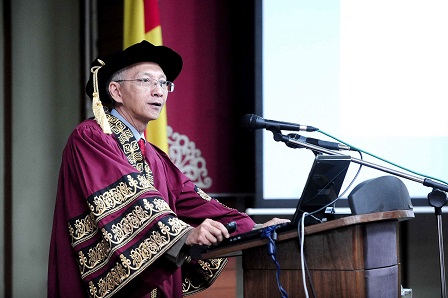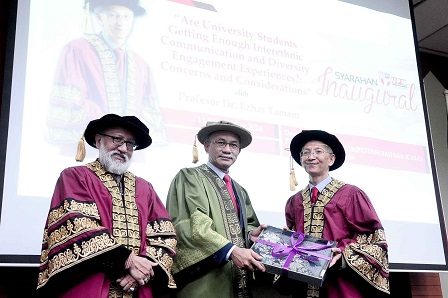
By Cheng Yi Wen and Nor Huda Musa
SERDANG - Malaysian undergraduates were not extensively engaged in interethnic interaction and socialization despite their awareness of the importance of such engagement and the continuous call for them to mingle on regular basis, said Faculty of Modern Languages and Communication, Universiti Putra Malaysia (UPM) lecturer, Prof. Dr. Ezhar Tamam.
As such, he said, universities must strategically promote and institutionalize diversity as a positive learning experiences and incorporate multicultural perspectives and diversity issues into many aspects of campus life.
He also said students should also be encouraged and challenged to think critically about diversities and differences, and to move from their own embedded worldviews to consider those of others.
“Positive interethnic contact and diversity learning grow well in a campus where the interethnic communications and relations climate is characterized by inclusiveness. This must be perceived and felt by the students,” he said in his inaugural lecture, entitled “Are University Students Getting Enough Interethnic Communication and Diversity Engagement Experiences? Concerns and Considerations.”

The inaugural lecture, organised by the Faculty of Modern Languages and Communication, was held at the Centre for the Advancement of Language Competence (CALC), UPM, recently.
Prof. Dr. Ezhar said interethnic interaction and socialization on a daily basis were not yet a norm in the lives of local students, and such engagement occurred more often in structured or facilitated situations, mostly on matters related to academic activities.
“While diversity is easily seen, it is not always felt or experienced by many students. Students are not getting enough of the much needed intercultural contact and diversity experiences, in and outside classrooms which are important for social cognitive development and democratic sensibilities,” he said.
He added that undergraduates were also found to have little interest in news in the media, although the news media has a role in the development of social attitudes.
“It also seems to be a norm for undergraduates not to capitalize on the wide ranging diversity-related learning opportunities that are presumably available to them throughout their three to four year’s of study period,” he said.
Prof. Dr. Ezhar said as such, interethnic contact and diversity learning experiences where relevant and appropriate, should be systematically and strategically integrated in the students’ study programme.
“Communication behaviour is shaped by perceptions and expectations. Thus, it is important to cultivate positive perceptions and expectations towards interethnic contact and experience as early as in the first year in university, through courses and co-curriculum activities,” he said.
He pointed out that it was necessary to develop positive interethnic contact expectations that members of other ethnic groups have an interest to interact with members of one’s own ethnic groups.
“This has to be emphasized and integrated in the formal curriculum and in co-curriculum activities,” he said.
Diversity-related learning experience, he added, was less likely to be extensive if it was left to the students themselves to manage, and as such educators should not leave interethnic contacts and cultured-related diversity engagement or learning to chance. - UPM
Date of Input: |
Updated: | amir_peli
MEDIA SHARING


























